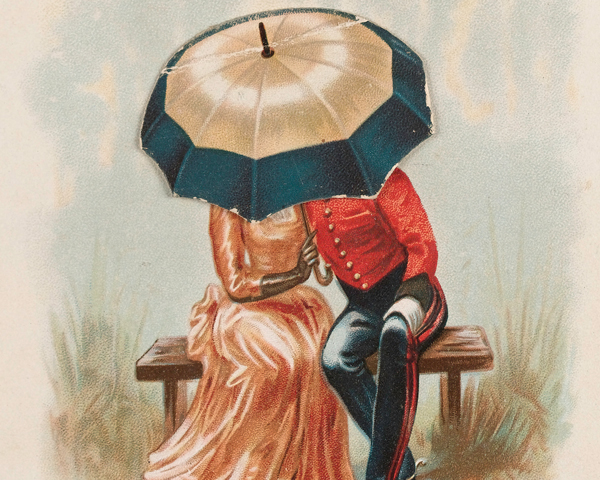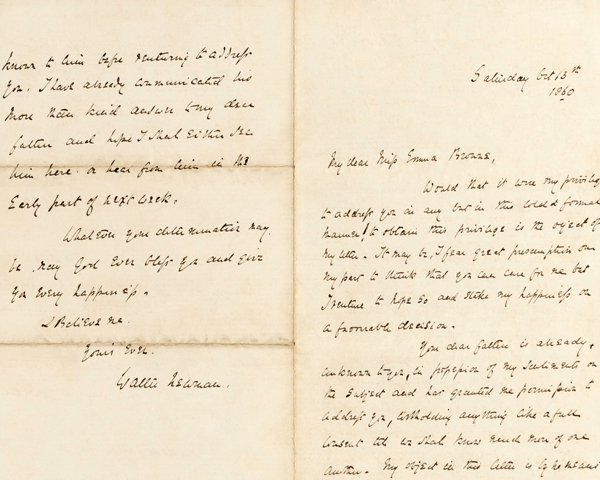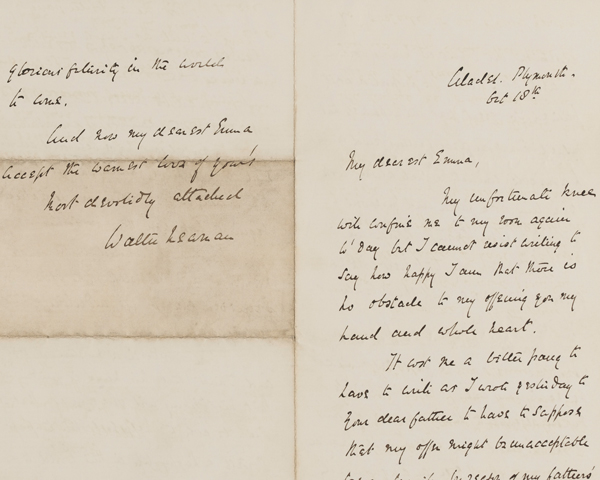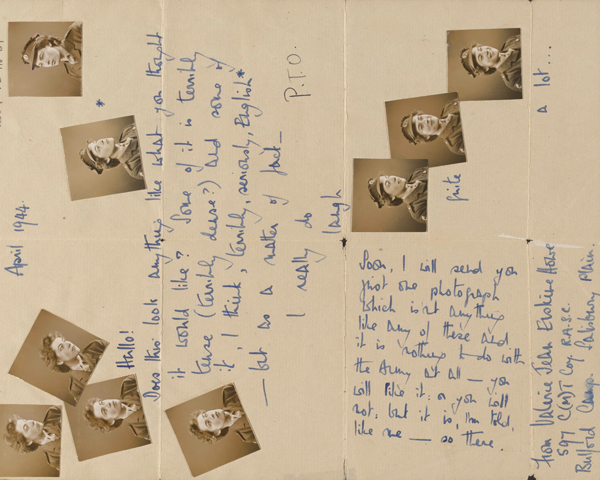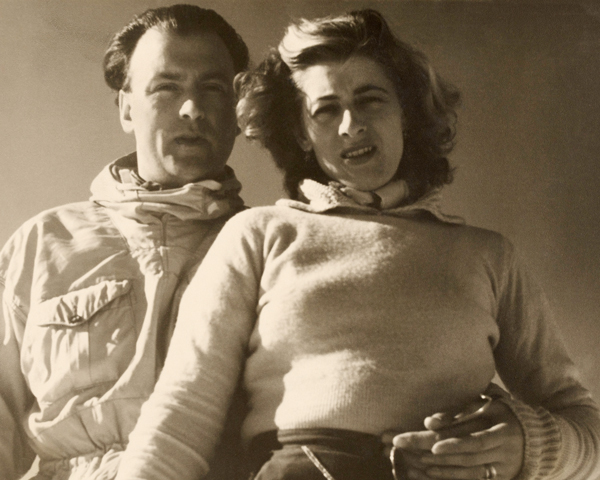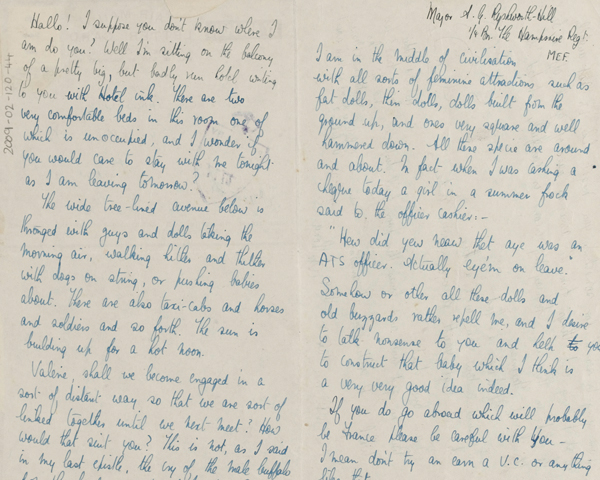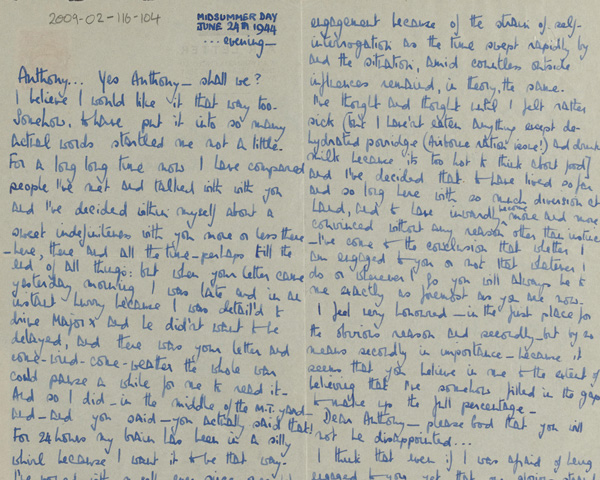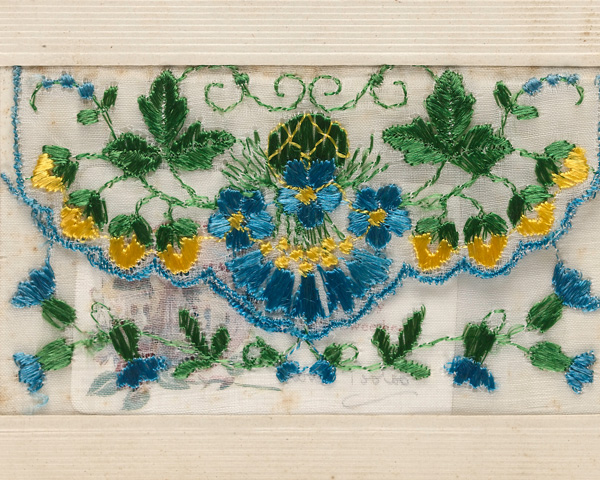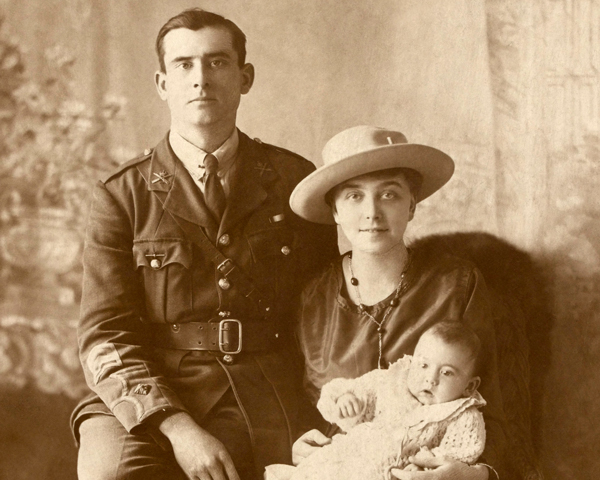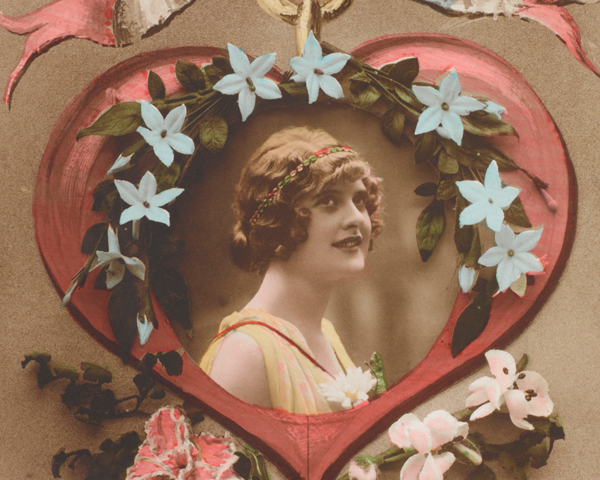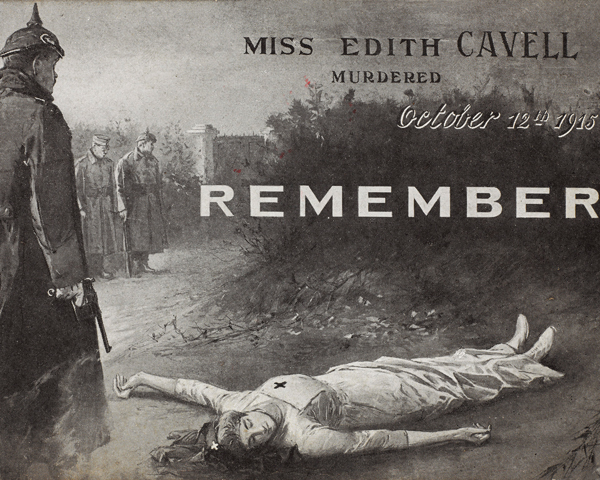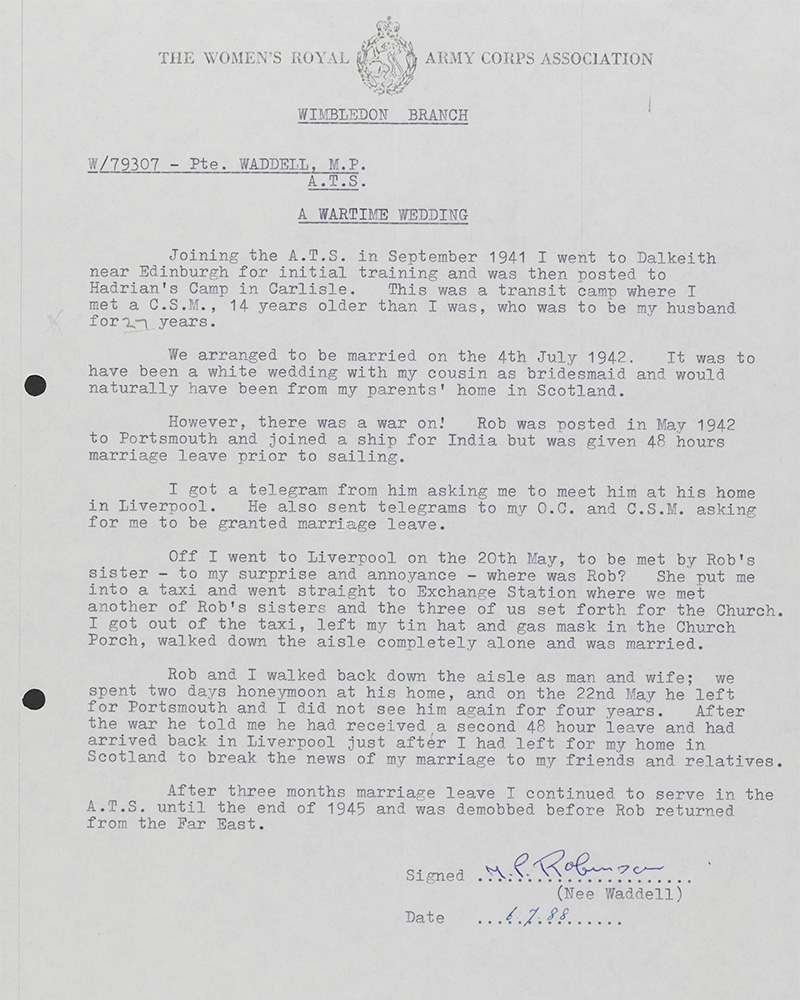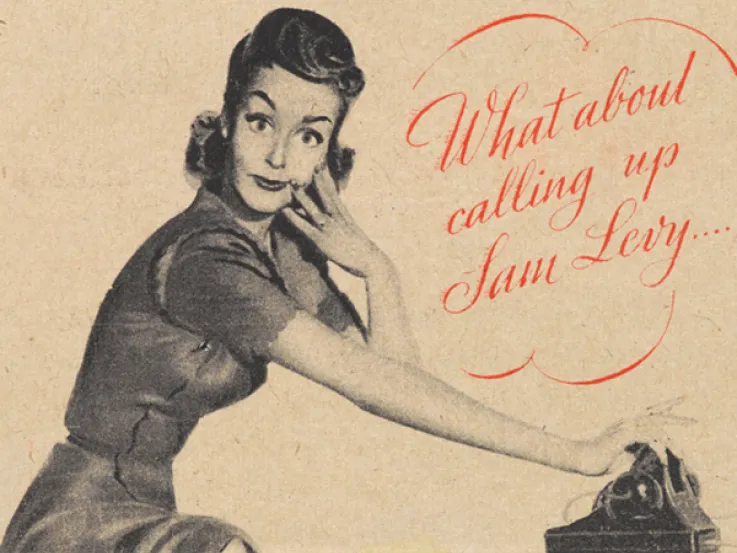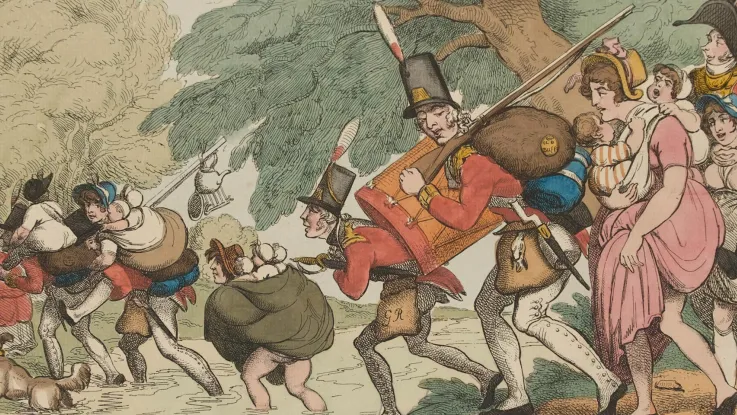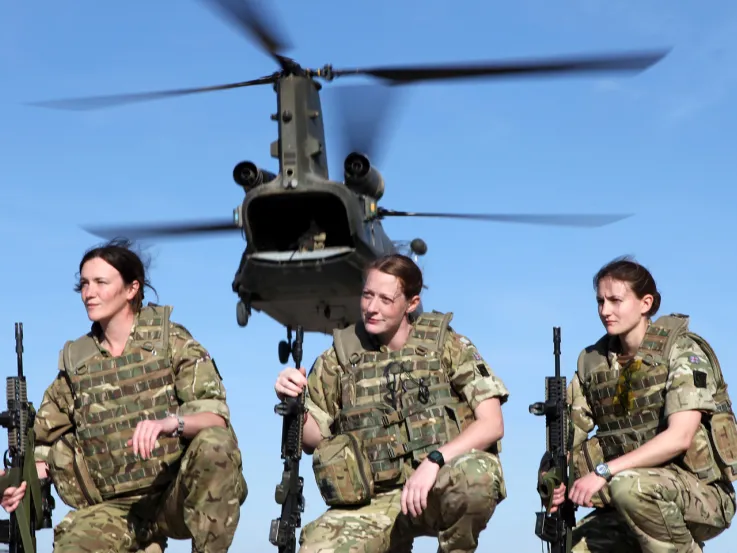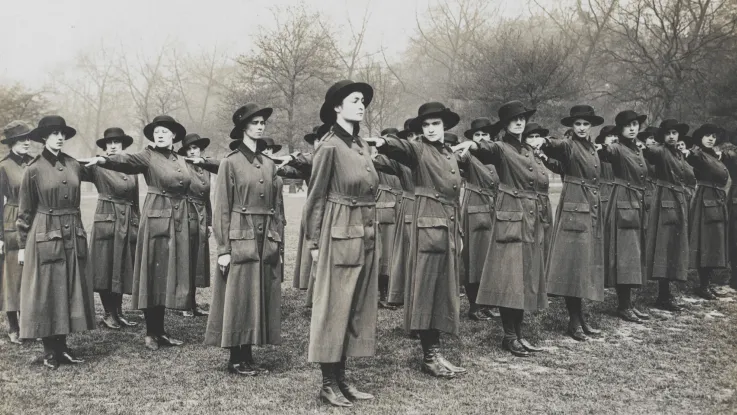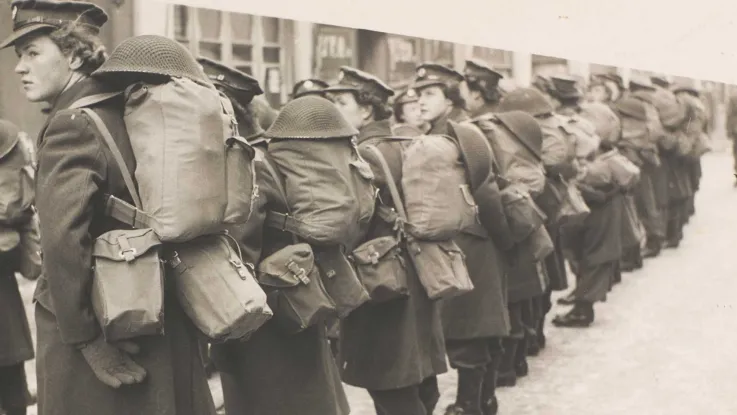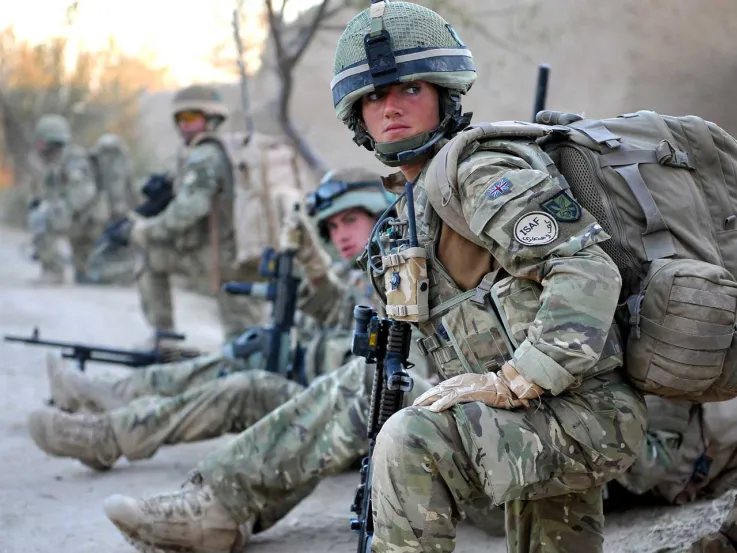Challenges
In some ways, meeting a sweetheart can be easier for a soldier than for a civilian. Soldiers travel across the globe and get to meet all sorts of people.
But in other ways, being a soldier can make meeting someone and settling down much harder. Frequent moving, or a posting to an isolated barracks, can take its toll on a soldier’s love life. On top of that, a relationship with a soldier naturally involves a constant concern for their safety.
‘It may be, I fear great presumption on my part to think that you can care for me but I venture to hope so... You will find in me one who will love you tenderly, one to whom to make you comfortable and happy would be the object of his life.’Lieutenant Walter Newman’s letter of proposal — 13 October 1860
Walter and Emma
Lieutenant Walter Newman (1836-94) was from Yeovil in Somerset. He served with the Royal Artillery from 1855, taking part in the Crimean War (1854-56) and the Indian Mutiny (1857-59). During his service, he wrote a series of love letters to his sweetheart, Emma Montague Browne (1844-1930), from County Down in Ireland.
On 13 October 1860, while based in Portsmouth, Walter wrote to 16-year-old Emma, asking for her hand in marriage. He had asked for her father’s consent, but to brace himself against rejection he wrote: ‘Don’t hesitate to tell me at once if you think that you cannot ever care for me, and may God give me strength to bear it calmly.’ Happily, Emma accepted Walter’s proposal with a letter of agreement.
Overjoyed, Walter wrote back on 18 October: ‘I cannot resist writing to say how happy I am that there is no obstacle to me offering you my hand and whole heart.' The couple married in Plymouth in 1861 and had three children: Edwin, Walter and Evelyn.
Walter continued to serve with the Royal Artillery until 1887, when he retired with the honorary rank of major-general. Unfortunately, he gambled away his army pension, leaving his son Walter to postpone his marriage to settle his father’s debts after his death.
‘Forgive me, dearest, if at times a trace / Of gloomy sorrow flits across my face / Oft am I sad when sitting all alone / Musing on thee who soon will be my own / To think that I so boorish, so unkind / Will anxious thought have pierced thy troubled mind.’Love poem by Lieutenant Walter Newman sent to Emma Browne — 18 October 1860
Valerie and Anthony
Valerie Erskine Howe (1920-2003) was from Uckfield in Sussex. During the Second World War (1939-45) she was a member of the Auxiliary Territorial Service (ATS). She had met her sweetheart, Major Anthony Ryshworth-Hill (1914-84) of the South Lancashire Regiment, in Oxford.
In April 1944, Valerie sent him the first of many witty letters covered with her photograph. She wrote: ‘Soon, I will send you just one photograph which isn’t anything like any of these and it is nothing to do with the Army at all - you will like it: or you will not: but it is, I’m told, like me - so there.’
Anthony replied that Valerie’s letter had given him ‘solace and consolation’ while fighting the war. He had treasured the letter covered with the image of her face and kept it in his pocket, close to his heart.
Valerie’s distinctive humour had obviously enchanted Anthony. In another letter, sent soon afterwards, he proposed to her: ‘Valerie, shall we become engaged in a sort of distant way so that we are sort of linked together until we next meet? How would that suit you?’
She wrote back: ‘Anthony... Yes. Anthony - shall we?’
The couple married in Hampshire in 1945. Anthony, who had taken part in the invasion of Italy over the course of 1944, was granted leave to return for the wedding. They enjoyed a brief, two-day honeymoon before he had to return to the front. From 1946 until 1964, Valerie accompanied Anthony on all of his Army duties, living with him in Ghana and Turkey.
‘Darling I love you so much - I love the silly hat you’re wearing and I love all your expressions - and well, I’ve always loved every little bit of you, since, I believe, possibly since the pyramids were built or perhaps a couple of years before.’Letter from Major Anthony Ryshworth-Hill to Valerie Howe — May 1944
Holly and Ada
Holland ‘Holly’ Chrismas (1890-1964) had joined the Army aged 14. He served in France with the 9th (Queen’s Royal) Lancers and the 1st (Royal) Dragoons during the First World War (1914-18). Like many soldiers serving on the Western Front, Holly regularly sent postcards to his sweetheart, Ada Manley.
His postcards to Ada were often intricately embroidered or conveyed romantic themes, like beautiful women and flowers. They were also very frequently inscribed with love notes, that even Holly himself described as ‘rather soppy’.
However, on 29 July 1916, Holly sent Ada a very distinct postcard, depicting the murder of the British nurse Edith Cavell. He wrote on it: ‘Am still looking out for a letter. Feeling very uneasy.’
Holly had been home on leave on 18 July. The couple had met, but evidently had a falling out when Ada had got into a ‘beastly temper’ on the way home. From Holly’s panicked note, it appears the argument had not been resolved before his return to France. Perhaps he felt the morose image on the postcard reflected the demise of their relationship.
Fortunately, the sweethearts resolved their tiff. A few months later, Ada began to write back to Holly. In September 1917, Holly was commissioned as a second lieutenant. He celebrated his promotion by marrying Ada a month later. Their son Eric was born in May 1918.
‘I got out of the taxi, left my tin hat and gas mask in the Church Porch, walked down the aisle completely alone and was married.’Margaret Robinson (nee Waddell), describing her wedding day — May 1942
Margaret and Rob
Margaret Waddell joined the ATS in September 1941, during the Second World War. While training in Carlisle, she met William ‘Rob’ Robinson, a company sergeant major. Despite an age difference of 14 years, they fell in love and agreed to marry the next summer.
The couple planned a traditional wedding in Scotland, with Margaret’s family in attendance. Unfortunately, Rob was called up for duty overseas in May 1942. He was to be sent to Portsmouth to board a ship for India, but was given a 48-hour leave pass to get married.
After receiving a hasty telegram, Margaret headed off to Rob's hometown of Liverpool on 20 May. On arrival, she was bundled into a taxi and they were quickly wed.
Following a brief honeymoon at home in Liverpool, Rob departed for India. Four years would pass before the married couple saw each other again.
Their experience was not untypical of Second World War weddings. Many were rushed, last-minute affairs conducted during brief periods of leave, with minimal preparation or decoration.
Margaret remained in the ATS until the unit was disbanded in 1949. Rob returned home soon after. The prolonged separation evidently had little negative impact on their marriage, as they remained together for 27 years.


